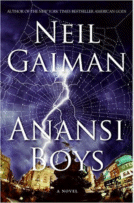Anansi Boys by Neil Gaiman Review
William Morrow, September, 2005Hardcover, 336 pages
ISBN: 006051518X

The Trickster is one of the most enduring mythical archetypes: the Chinese have the Monkey King, the Celts have Puck, the Norsemen have Loki, the Native Americans have Coyote, and the West Africans have Anansi the Spider. The narrator informs us: "In the old stories, Anansi lives just like you do or I do, in his house. And he is good-hearted and lucky, and sometimes even honest. Sometimes he is good, sometimes he is bad. He is never evil. Mostly, you are on Anansi's side. This is because Anansi owns all the stories." Neil Gaiman explored the darker side of mythology, story and gods that walk the earth in American Gods. In Anansi Boys, Gaiman returns to the American Gods universe for a lighter, funnier look at the purpose and power of the trickster legends and why they are important.
Charles "Fat Charlie" Nancy was raised in Florida, but now lives in London. He works at a miserable job and has a pleasant fiancée, who has a most unpleasant mother who despises Fat Charlie (who isn't fat at all, but who was stuck with the nickname when his father decreed it years ago). Fat Charlie has spent most of his life being embarrassed. His flamboyant father's constant practical jokes, singing in public, speaking to girls: all these things cause him intense humiliation and misery. When Charlie must go back to Florida for his father's funeral he finds out two things that will change his life forever: his father was a minor god called Anansi, and Charlie has a twin brother named Spider. In a moment of poor judgment, Charlie tells a nearby spider that he'd like to meet his brother. The handsome, confident and magical Spider promptly arrives on Fat Charlie's doorstep: within one day Charlie's home, his job and his fiancée are all slipping out of his grasp because of Spider's interference. Finally determined to fight back, Fat Charlie visits some old witches who give him some extraordinarily bad advice and send him off to the beginning of the world, where/when all the stories live. When Fat Charlie strikes a most unwise bargain, he and his brother Spider are in mortal danger in both the real and the magical world.
Although it has fantastic elements, Anansi Boys is essentially a family story. Gaiman notes in his acknowledgements "I don't think I could have written Fat Charlie without having had both an excellent but embarrassing father and wonderful but embarrassed children. Hurrah for families." And that points out one message of the story: that even though they can be immensely embarrassing at times, families really are wonderful things. But there is more than a funny, entertaining and wise family story here.
In our serious world which is full of war, violence, natural disasters, and a host of illnesses, Gaiman reminds us of the need for the trickster, the merry fool who brings silliness and compassion to the world. When we hear a minor god say: "The important thing about songs is that they're just like stories. The don't mean a damn unless there's people listenin' to them," it seems clear that it is Neil Gaiman himself who is actually speaking to the reader. But he is one author who won't ever need to wonder if anyone is listening to his amazing stories: we're definitely listening.
Ordering information: Amazon.com
Return to the October 2005 issue of The IWJ.
